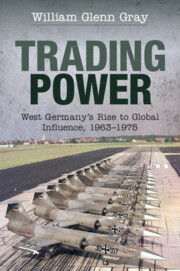Book contents
- Trading Power
- Trading Power
- Copyright page
- Contents
- Figures
- Acknowledgments
- Abbreviations
- Introduction
- 1 The Unraveling of Adenauer’s Grand Strategy (1962–1963)
- 2 America’s Junior Partner (1963–1964)
- 3 Twenty Years After (1964–1965)
- 4 The Stability Imperative (1965–1966)
- 5 Gaullist Temptations (1966–1968)
- 6 The Magnetism of Prosperity (1967–1968)
- 7 A Decisive Election (1969)
- 8 The Zenith of Ostpolitik (1970)
- 9 The European Pendulum (1970–1972)
- 10 Hazards from the Global South (1970–1972)
- 11 The Embattled Chancellor (1971–1972)
- 12 The Center of Europe (1973)
- 13 The Crisis Management Team (1973–1974)
- 14 New Structures for the West (1974–1975)
- Conclusion
- Select Bibliography
- Index
8 - The Zenith of Ostpolitik (1970)
Published online by Cambridge University Press: 14 October 2022
- Trading Power
- Trading Power
- Copyright page
- Contents
- Figures
- Acknowledgments
- Abbreviations
- Introduction
- 1 The Unraveling of Adenauer’s Grand Strategy (1962–1963)
- 2 America’s Junior Partner (1963–1964)
- 3 Twenty Years After (1964–1965)
- 4 The Stability Imperative (1965–1966)
- 5 Gaullist Temptations (1966–1968)
- 6 The Magnetism of Prosperity (1967–1968)
- 7 A Decisive Election (1969)
- 8 The Zenith of Ostpolitik (1970)
- 9 The European Pendulum (1970–1972)
- 10 Hazards from the Global South (1970–1972)
- 11 The Embattled Chancellor (1971–1972)
- 12 The Center of Europe (1973)
- 13 The Crisis Management Team (1973–1974)
- 14 New Structures for the West (1974–1975)
- Conclusion
- Select Bibliography
- Index
Summary
In Chapter 8, focus turns to the handiwork of Brandt’s Ostpolitik – the negotiation of the Moscow and Warsaw Treaties in 1970. Egon Bahr’s bargaining strategy in Moscow was hasty and dilettantish; he did not worry overly about the contents of the treaty with the USSR, since he saw the agreement as only one component of an interlocking series of treaties. When the substance of the “Bahr Paper” was leaked, his secretive approach and his failure to address the Berlin problem further polarized German politics. The CDU/CSU vehemently rejected Brandt’s policies and members of the coalition parties began to defect. The external resonance of German Ostpolitik was nonetheless enormous. Brandt’s meeting with Brezhnev in Moscow alerted the world to the ebbing of Soviet hostility, resulting in greater maneuvering room for Bonn. When the chancellor kneeled in Warsaw, it appeared to signal German acceptance of the moral weight of Nazi crimes. A closer view shows, however, that the Federal Republic was extremely hard-nosed toward Poland; it demanded emigration rights for ethnic Germans while refusing to offer restitution payments. Brandt’s Germany looked forward, not backward.
- Type
- Chapter
- Information
- Trading PowerWest Germany's Rise to Global Influence, 1963–1975, pp. 231 - 264Publisher: Cambridge University PressPrint publication year: 2022

